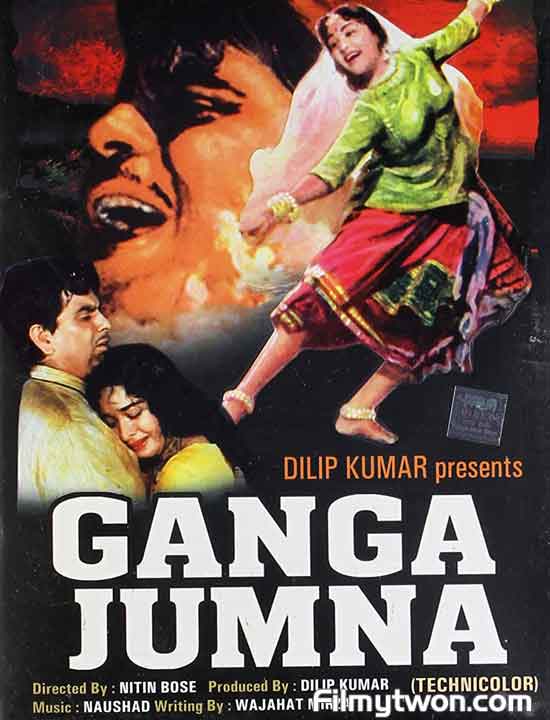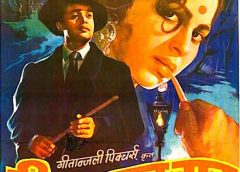Hindi cinema had a love affair with dacoit stories beginning from Mother India, Ganga Jumna and through ‘60s thru to Sholay. Many great movies were made on the life and times of dacoits, roaming the Chambal ravines and other places in the Hindi heartland of India, even to the extent of glorifying them. Movies like ‘Jis Desh Mein Ganga Behti Hai’ and ‘Mujhe Jeene Do’ also stand out in the crowd.
Ganga Jumna was also of the same genre but the difference was that no cinematic liberties were taken while narrating the tale on screen and a village pastoral style and substance was adhered to. It had genuine dialogues in chaste Awadhi/Bhojpuri dialect which the star of the era Dilip Kumar delivered with absolute ease, thus putting him into a different league of actors and is not called a thespian for nothing. This movie belongs to Yusuf Khan aka Dilip Kumar, he gave a spirited performance and is considered one of his best role. This was the only movie starring both real life brothers Dilip Kumar and Nasir Khan in reel life too. Most successful and talked about movie of 1961. The theme of this movie was repeated in city settings in the hugely popular Bachchan’s Deewar, even he acknowledged in his own words that it was this act of Kumar from which he learnt a lot and gave him inspiration to enter the film industry. It released on December 8, 1961.
Set in a backward village Haripur in the Awadh area of India Ganga Jumna is tale of two brothers Ganga and Jamuna living with their poor mother. Ganga (Dilip Kumar) helps his mother in her work at the kindly village zamindar’s place but has run-ins with his drunkard brother-in law Hariram (Anwar Hussain) and wants his younger brother Jamuna who is good with learning to study further. When the employer accuses their mother of theft and though she is helped out by the villagers it is too much for her to bear and she passes away leaving Jamuna in Ganga’s care. Ganga (Dilip Kumar) works hard, is spirited and saves money to send Jamuna (Nasir Khan) to study further in the city, while doing odd jobs for the same landlords. Life takes a turn when Ganga saves Dhanno (Vyjantimala) a village belle from the lusty advances of the wily Hariram who anyways has an axe to grind with him and in turn applies the same trick applied on his mother and he is incarcerated for robbery. His imprisonment has an adverse effect as he finds out after his release that his brother was rendered penniless in the city. In the fit of anger he raids the zamindar and is now on the other side of the law. There in the city though rendered penniless his brother finds a savior in the form of a police officer (Nasir Hussain) and joins the force too. As fate would have it Jamuna is posted in the same area where his brother Ganga is an acclaimed outlaw and asks him to lay down his arms to the law, Ganga would have none of it when Dhanno is killed. The climax and the chase that ensues Ganga is fatally wounded by Jamuna to be killed.
Having seen so many films, some movies surprise you with the panache and characters that the actors get into, this was one of them. The highlight of the movie was the interaction between of the main characters Ganga and Dhanno in the first half of the movie, fantastic chemistry, it was absolutely magical, you are actually transported into a North Indian village as the scenes play out on the screen and are slowly drawn into their lives.
Ganga Jumna becomes a bit more somber after the half time. Its songs are the highlights, “Nain Lad jaihain”, “Dhondo Dhondo re saajna more kaan ka baala” and “Do Hanson ka Joda” were chartbusters giving an apt rustic feeling. The movie was not only a superhit in India but did excellent business in the Soviet Union. Generated over 110 million on the box office worldwide.
It was critically and commercially appreciated. Vyjantimala won the Filmfare Best Actress Award for her Dhanno. Though Dilip Kumar was nominated for the Best Actor Award but it eventually went to Raj Kapoor and there was criticism about this issue in the media.
– Revisited by PAWAN GUPTA





